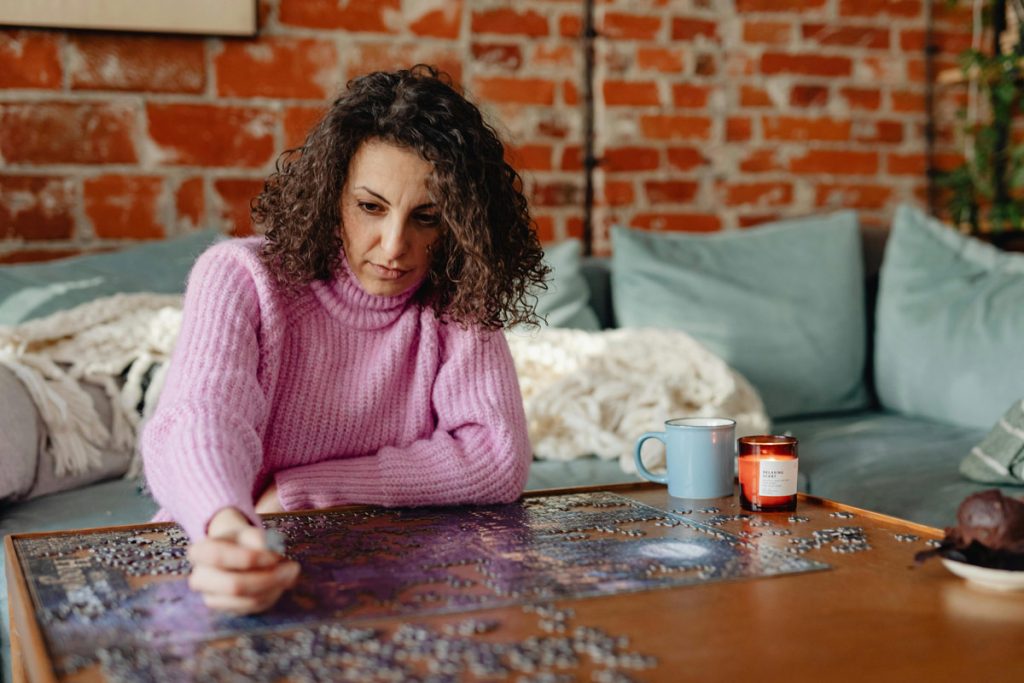“I don’t have the energy to do anything.”
This is one of the most common things I hear when I encourage my clients with depression to engage with life. And I get it. When you’re living with depression, even the most minor tasks can feel overwhelming. You might have heard that exercise helps, or that staying connected can make a difference, but when your energy is flagging and your thoughts feel heavy, where do you even begin?
One of the most powerful truths I’ve seen in my work as a therapist is this: action precedes motivation. Many people wait to feel better before doing things they used to enjoy, but starting small is usually what lifts the fog. We don’t have to feel inspired to act. Just like going to the gym on a low-energy day, beginning can bring relief.
Hobbies aren’t meant to fix depression. They’re gentle invitations—ways to give your brain and body a reason to re-engage with life. Even just five minutes of sketching, journaling, or cooking can offer calm, structure, and a sense of control. Over time, those small moments can create meaningful changes.
Why Hobbies Help
Hobbies offer more than distraction. They can:
- Add structure and rhythm to the day
- Provide a sense of accomplishment—even from tiny wins
- Spark interest and curiosity
- Shift focus outward
- Reconnect us with parts of ourselves that want to create, play, or explore
- Offer small moments of control during uncertain times
You don’t have to love the activity. You don’t even have to be good at it. The key is to begin.
1. Coloring or Sketching
Coloring and sketching bypass the need for words. You don’t need to feel inspired—pick up a pen, pencil, or crayon and start drawing. Trace a mandala, doodle nonsense, or fill in shapes. The rhythm of movement can bring a flicker of calm. Finishing something—even a messy page—offers a sense of completion and quiet mastery.
2. Journaling
Journaling isn’t about eloquence—it’s about honesty. One sentence is enough: “I feel heavy today.” “I don’t want to do this.” Try naming three things you noticed—a smell, a sound, a kind gesture. Depression filters out the good; journaling can help you let some of it back in.
3. Cooking Something Simple
Depression often undermines structure in one’s life, but cooking brings it back. There’s a beginning, middle, and end. Even making toast or tea can be an act of care. Choose something familiar. Feel the warmth of the stove, smell the food. You’re nourishing your body—and reinforcing that you matter.
4. Sculpting with Clay or Pottery
Clay is grounded. It resists and yields, just like emotions. No skill required—you can pinch, roll, or press simple shapes. The process itself—weight, texture, repetition—brings presence. A 2017 study found that clay art therapy helped adults with depression improve mood, motivation, and decision-making. Clay isn’t just a medium—it’s a metaphor for change.
5. Indoor Gardening
Plants ask for very little—just water, light, and attention. But they offer rhythm and renewal—a cactus on your desk, basil by the sink. You water, you notice. A leaf unfurls, a stem leans toward light. Even if you forget for a while, it keeps growing. That survival—yours and the plant’s—tells a quiet story of resilience.
6. Listening to or Creating Music
Music doesn’t need words. A song you once loved can stir memory or emotion. Some people hum, tap rhythms, or sing softly. Humming, in particular, stimulates the vagus nerve and can help regulate the nervous system. You don’t need to perform—just listen or create without pressure.
7. Puzzles and Brain Games
Jigsaws, crosswords, Sudoku—these quiet activities offer structure when everything feels chaotic. You don’t have to achieve anything. Just place a piece or solve a clue. Focused attention creates mental space and can provide minor hits of dopamine, the brain’s “feel-good” chemical.
8. Group Activities
Lack of connection is a risk factor for depression, and connection helps. You don’t have to talk much. Just show up. Try a community art night, walking group, or online gathering. Even light contact can break isolation. Being around others adds direction to the week and reminds you you’re not alone.
9. Spending Time in Nature
You don’t need to hike. Instead, sit on the porch. Notice a tree. Feel the air. These small moments—sunlight on your skin, the sound of leaves—help regulate your nervous system and connect you to something larger than your pain. Choose a nearby spot and return to it daily, even if only briefly. Let it become an anchor.
10. Taking Pictures with Your Phone
Taking pictures with your phone helps you notice things more clearly. Not for social media—just for you. Light on the wall, your cat stretching, a chipped mug. One photo a day is enough. Looking back creates a visual trail: you were here, and you noticed something.
Coping Card: Action Precedes Motivation
- Motivation comes after movement. You don’t have to feel ready—start small.
- Lower the bar. If 30 minutes feels like too much, try 3. Or 1.
- Match your energy—stillness or motion—both count.
- Let go of the outcome. This isn’t about doing it well. It’s about doing it.
- Celebrate effort. Starting is brave. Progress follows.
A Final Word
Hobbies won’t cure depression—but they can support recovery. They offer footholds. Gentle moments of return. Each time you reach for a pen, a plant, or a puzzle, you’re doing something important. You’re making contact with life.
Even when motivation is low, choosing to engage—however briefly—is an act of resilience. And it matters.
About the Author: Eliana Bonaguro is a Licensed Mental Health Counselor specializing in anxiety and depression in adults and young adults. She combines evidence-based tools with a compassionate, client-centered approach to help individuals reclaim their lives. Learn more at https://ellie-counseling.com.
Photo by Photo By: Kaboompics.com: https://www.pexels.com/photo/a-woman-in-pink-sweater-6633479/
The opinions and views expressed in any guest blog post do not necessarily reflect those of www.rtor.org or its sponsor, Laurel House, Inc. The author and www.rtor.org have no affiliations with any products or services mentioned in the article or linked to therein. Guest Authors may have affiliations to products mentioned or linked to in their author bios.
Recommended for You
- When the World’s Pain Becomes Your Own: Understanding Secondary Traumatic Stress - February 17, 2026
- How to Keep Love Alive: The Balance Between Romance and Routine - February 12, 2026
- The Power of Peer Support: How Young Adults Navigate Mental Health Recovery Together - February 9, 2026





